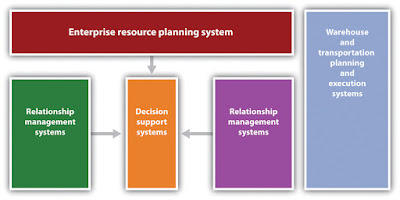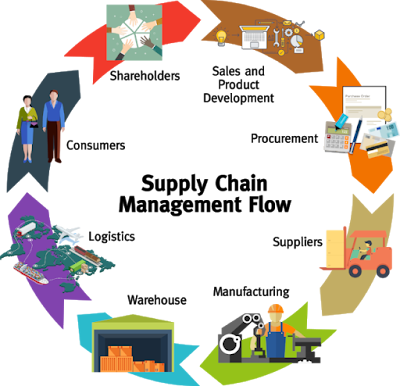ERP Supply chain management
ERP Supply chain management:
ERP :
ERP is enterprise resource planning. It's a business process management software that manages and integrates a company's financials, supply chain, operations, reporting, production, execution, control, distribution human resource activities, and others that are inter-related to each other.
Supply chain management:
It involves planning, execution, control, and monitoring of supply activities that includes storage and transportation and the market aspect of effectively managing demand and supply to meet customer demands.ERP Supply chain management is the handling of the entire production flow of a good or service starting from the raw components all the way to delivering the final product to the consumer.
Most large and mid-sized companies have complex organizational structures so they need to make sure that, right data and information is available all the time. who want to see that information easily can access it whenever they want
Role of supply chain management in ERP :
The integration of Supply chain management and ERP allows manufacturing and distribution businesses and this software has a strategic value for your business
A growing number of businesses recognize the many potential benefits of Enterprise Resource Planning when it comes to managing business information, integrating various systems and working processes, and ensuring optimal operational efficiency.
Some benefits of ERP on Supply Chain Management:
Improved Efficiency
Easy to Decision making
Order Tracking
Improves Productivity
Inventory Optimization
Automated Purchasing:
All popular ERP systems to auto place the orders with vendors as the inventory reaches a certain point. It will significantly reduce any chance of running out of products at any point in time during production.it can reduce error in the manufacturing business
Vendor Performance:
ERP helps manufacturers and distributors to analyze the product, supply, and quality performance of their vendors. These insights are useful in deciding the performance of a vendor and decide to continue or switch to another vendor.ERP supply chain management focuses on the digital transformation of the business process.
Common vendor and supplier selection criteria include:
Financial stability
Technical support availability and optimizing processes
supplier's track record
the total cost of dealing with the supplier, including material cost, communications methods, inventory requirements, and incoming verification required.
Total cost assessment
Types:
There are three different types of flow in ERP supply chain management
Material flow
Information/Data flow
Money flow
Material flow:
Material flow is which transfers the item from the producer to the consumer. at the same time, The item can also return from the consumer to the producer for any kind of repairs, or exchange for an end-of-life material.
Information/Data flow:
Information/data flow comprises the request for quotation, purchase order, monthly schedules, engineering change requests, quality complaints, and reports on supplier performance from the customer side to the supplier. we can see that other partners like distributors, dealers, retailers, logistic service providers participate in the information network.
Money flow:
includes payment schedules, credit terms, consignment, and also title ownership arrangements. Workflow automated by ERP will reduce operational costs.
Modes of ERP supply chain process:
Warehousing:
Warehousing plays an important role in the supply chain process. In today’s industry, customers expect tremendous change. We want everything at our doorstep that too with an efficient price. We can say that the management of warehousing functions demands the apparent volume of distribution merging of engineering, IT, human resources, and supply chain skills.
Inventory management:
The role of inventory management is to maintain the desired stock level of specific products or items. The desired level is a function of customer service requirements and the cost of inventory investment. controlling and overseeing purchases from suppliers and customers, maintaining the storage of stock, controlling the amount of product for sale, and order fulfillment. Products are shipped to customers.
Transportation:
The four primary modes of transportation in logistics are shipments by truck, ship, train, and plane also known as road, maritime, train, and air shipments. While each of these modes of transportation has unique benefits, knowing which method is right for your business requires carefully considering which you want.




ReplyDeleteThanks for sharing this informative blog for supply chain management. I am doing my PGCM Course in supply chain form distance learning center and this info was very useful to
me. keep sharing.
Informative and helpful Article. Really good work. Appreciate it. You might be looking for SaaS ERP Software
ReplyDeleteThanks for sharing this post.crm software in chennai.It's really good work.
ReplyDelete
ReplyDeleteThanks for sharing the valuable information erp software in Chennai